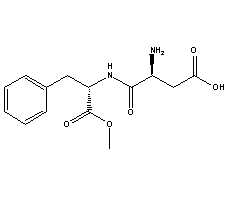Aspartame
Inquiry
| Post Date: | Mar 27,2019 |
| Expiry Date: | Mar 26,2020 |
| Detailed Description: |
Cas No. :22839-47-0
Quantity: 1000FCL Specs:FCC IV Price:1 USD Metric Tons Payment Method: LC, T/T, DP 1. Introduction: As an artificial sweetener, Aspartame has a sweet flavor, nearly without calory and carbohydrate. It is 200 times as sweet as saccharose and can be completely absorbed and metabolized by the body without any harm. It is safe and reliable, with pure taste. At present, more than 100 countries have approved the use of Aspartame. It has been widely used in all types of drinks, candy, food, health care products and so on. This sweetener is marketed under a number of trademark names, including Equal, NutraSweet, and Canderel, and is an ingredient of approximately 6, 000 consumer foods and beverages sold worldwide. It is commonly used in diet soft drinks, and is provided as a table condiment in some countries. It is also used in some brands of chewable vitamin supplements and common in many sugar-free chewing gums and has now been found in some chewing gums that are not sugar free. However, aspartame is not always suitable for baking because it often breaks down when heated and loses much of its sweetness. In the European Union, it is also known under the E number (additive code) E951. Aspartame is also one of the sugar substitutes used by people with diabetes. Because sucralose, unlike aspartame, retains its sweetness after being heated, it has become more popular as an ingredient. This, along with differences in marketing and changing consumer preferences, has caused aspartame to lose market share to sucralose. ITEM STANDARD APPEARANCE WHITE POWDER ASSAY 98.0 ~ 102.0% SPECIFIC ROTATION [A]N20 +14.5º ~ +16.5º TRANSMITTANCE ≥95% LOSS ON DRYING ≤4.5% RESIDUE ON IGNITION ≤0.2% PH 4.5~6.0 HEAVY METALS ≤10PPM ARSENIC ≤3PPM LEAD ≤1PPM ORGANIC VOLATILE IMPURITIES IN CONFORMITY WITH FCCIV/USP24 OTHER RELATED SUBSTANCES ≤2.0% 5-BENZYL-3.6-DIOXO-2-PIPERAZINEACETIC ACID ≤1.5% L-A-ASPARTYL L-PHENYLALANINE 0.25% MAX L-PHENYLALANINE 0.5% MAX TOTAL ACROBIC COUNT ≤100CFU/G MOULDS AND YEASTS ≤100CFU/G E.COLI NEGATIVE SALMONELLA S.D. NEGATIVE 2 Characteristics and advantages Intensive sweetness, 200 times as sweet as sucrose in 3% solution Clean sweetness without bitter, chemical or metallic after-taste Improving the taste profiles Safe sweetener with low energy No causing tooth decayed Similar digesting, assimilating and metabolizing process with that of proteins Long-lasting perceivable sweet taste Readily blending with most sweeteners to obtain ideal synergistic effect 3 Application of Aspartame In 1965, Aspartame was discovered. In 1981, FDA approved the use of Aspartame as tabletop sweeteners and flavor-improvers. In 1981, Canada approved the use of Aspartame in foods and beverages. In 1983, FDA approved the use of Aspartame in carbonated soft drinks. In 1983, U.K. Approved the use of Aspartame. In 1983, Japan approved the use of Aspartame. In 1986, China approved the use of Aspartame. In 1988, Brazil approved the use of Aspartame. In 1993, Aspartame was approved of use in Confectioneries, baked foods, low-alcohol beer and all remaining nonalcoholic beverages. In 1996, FDA approved Aspartame as a ‘general purpose’ sweetener. ADI of Aspartame set by FAO/WHO JECFA: 40mg/kg body weight ADI of Aspartame set by FDA: 50mg/kg body weight Aspartame is with the characteristics of good taste, high sweetness, safe and reliable, and low energy with the same sweetness, widely used in a variety of products, including beverages, chewing gum, candy, candied fruit, mixed dessert, pudding and stuffing, frozen dessert, yogurt, sugar subull craptitute, and some drugs, such as vitamins and oral liquid, etc. |
| CAS Registry Number: | 22839-47-0 |
| Synonyms: | ;Equal;L-alpha-aspartyl-L-phenylalanine-methylester;L-Aspartyl-L-phenylalanine methyl ester;L-Phenylalanine, N-L-alpha-aspartyl-, 1-methyl ester;Nutrasweet;methyl alpha-aspartylphenylalaninate;methyl L-alpha-aspartyl-L-phenylalaninate;APM; |
| Molecular Formula: | C14H18N2O5 |
| Molecular Weight: | 294.3031 |
| Molecular Structure: | 
|
| Safety Description: | S24/25:; |
| Company: | JK Bio-Chem Co., Ltd. [ China ] |
| Contact: | Terry |
| Tel: | +86-0731-88689669 |
| Fax: | +86-0731-88689665 |
| Email: | xuqihn@163.com |
-
Disclaimer statement:The information and data included above have been realized by the enterprises and compiled by the staff, and are subject to change without notice to you. The Chemnet makes no warranties or representations whatsoever regarding the facticity, accuracy and validity of such information and data. In order to ensure your interest, we suggest you chose the products posted by our gold suppliers or VIP members.


